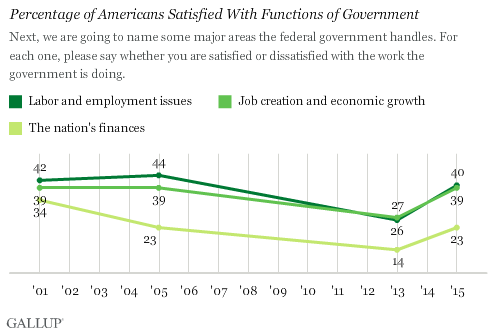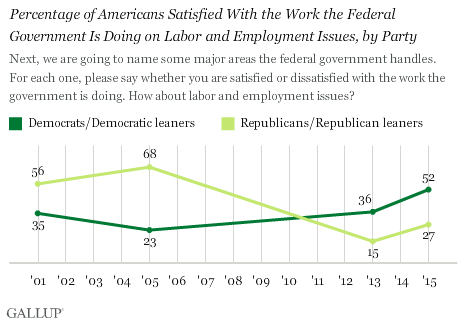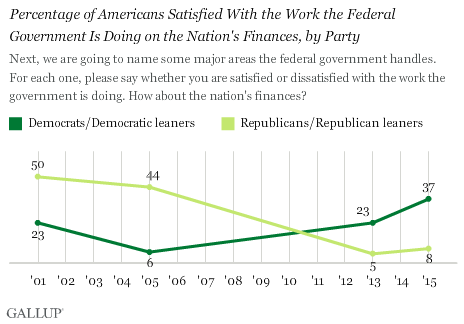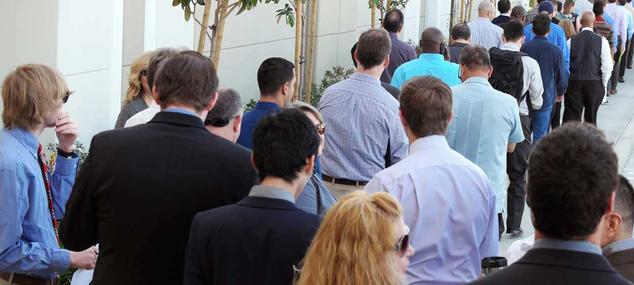Story Highlights
- U.S. satisfaction up with gov't handling of nation's finances
- Satisfaction with work on employment, economic growth also up
- Still, majorities dissatisfied on all three measures
WASHINGTON, D.C. -- Majorities of Americans remain dissatisfied with how the federal government handles labor and employment issues, job creation and economic growth, and the nation's finances. But they are significantly more satisfied with the government's handling of these issues than they were in 2013, which marked the low in Americans' views on government efforts to address these issues.

Americans' increased satisfaction with these functions of government comes at a time when hiring activity is up and confidence in the economy is higher than it has been in the past several years. Further, the unemployment rate as reported by the Bureau of Labor Statistics has dropped from 7.5% at the time of the 2013 poll to 5.5% in March of this year. This uptick in satisfaction also may be related to fewer Americans mentioning unemployment as the most important problem facing the nation in recent months and more saying now is a good time to find a quality job. The latest results in satisfaction with government functions are from Gallup's April 29-May 2 survey.
Of the three measures, Americans' satisfaction with the government's handling of labor and employment issues is up the most since 2013, with 40% now satisfied -- a 14-percentage-point jump from 2013. Americans' satisfaction with the government's efforts on job creation and economic growth has increased 12 points to 39%, while satisfaction with the handling of the nation's finances has ticked up nine points to 23%. Still, most Americans continue to be dissatisfied with the government's handling of labor and employment (57%), job creation and economic growth (60%) and the nation's finances (74%).
Dems and Leaners Most Likely to Be Satisfied With Handling of Employment Issues
Democrats and independents who lean Democratic are about twice as likely as Republicans and independents who lean Republican to be satisfied with the U.S. government's handling of labor and employment issues, 52% vs, 27%. In 2001 and 2005, Republicans were more likely than Democrats to be satisfied on this dimension, reflecting the general pattern of partisans' being more satisfied when the president is from their own party. Still, both party groups have shown more widespread satisfaction since 2013.

The partisan gap in satisfaction with the government's handling of labor and employment was widest in 2005, during George W. Bush's presidency, when Republicans were nearly three times as likely as Democrats to be satisfied. Bush scuffled with predominantly Democratic labor unions during his presidency on a variety of issues ranging from Social Security to workplace safety rules and minimum wage laws.
On job creation and economic growth, as with labor and employment issues, Republicans' and Democrats' satisfaction is closely linked with the party of the incumbent president, and thus Democrats (56%) are much more likely than Republicans (21%) to be satisfied. Under Bush, majorities of GOP-leaners were satisfied with his government's handling of the issues, compared with less than a third of Democrats.
Fewer Than One in 10 Republicans and Leaners Satisfied With Handling of U.S. Finances
While Democrats are currently more satisfied than Republicans with the government's handling of the nation's finances, they are not as satisfied as Republicans were in 2001 and 2005 under Bush.

Bottom Line
For all three questions of satisfaction with the federal government's performance on key economic matters, most Americans continue to feel dissatisfied, which makes sense given their net negative assessments of the U.S. economy's current and future standing. Satisfaction with handling of the nation's finances is especially low.
Still, the improvements are noteworthy, and reflect the economic progress made, as seen in a variety of government statistics. But while Americans may perceive progress in a variety of areas of government work, they have become increasingly dissatisfied with its handling of poverty, which is related to unemployment and other measures of overall U.S. economic standing.
The survey asks Americans only if they are satisfied or dissatisfied, and does not delve into possible solutions for addressing these economic issues. So, Americans could be dissatisfied with the government's handling of them for a variety of reasons. Party breakdowns of Americans' views do shed light on their feelings, however, as those who identify with the current president's party tend to be much more satisfied with the government's handling of these issues under his administration.
Survey Methods
Results for this Gallup poll are based on telephone interviews conducted April 29-May 2, 2015, on the Gallup U.S. Daily survey, with a random sample of 2,020 adults, aged 18 and older, living in all 50 U.S. states and the District of Columbia. For results based on the total sample of national adults, the margin of sampling error is ±4 percentage points at the 95% confidence level. All reported margins of sampling error include computed design effects for weighting.
Each sample of national adults includes a minimum quota of 50% cellphone respondents and 50% landline respondents, with additional minimum quotas by time zone within region. Landline and cellular telephone numbers are selected using random-digit-dial methods.
Learn more about how the Gallup U.S. Daily works.

